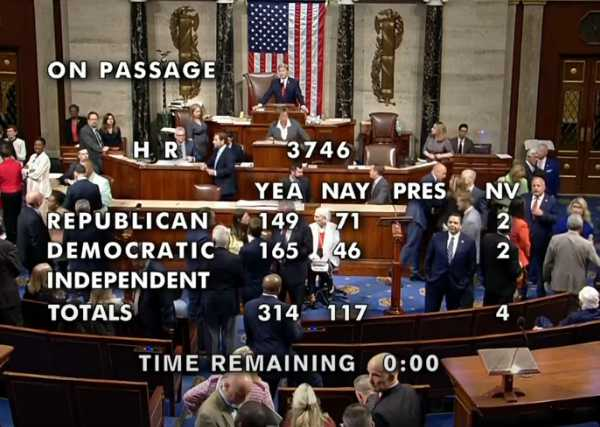|
|
Speaker McCarthy Commission to Find Ways to Cut Government Spending, Including Social Security and Medicare, as Congress Passes Bill to Raise Debt Ceiling |
|
Speaking on Fox News, House Speaker Kevin McCarthy announced plans to assemble a bipartisan commission to look at potential cuts to Social Security, Medicare, and all federal government spending. |
|
The new commission announcement came as many hardline members of the House Freedom Caucus revolted over the debt limit deal McCarthy struck with President Biden. The committee would be formed despite vehement Republican claims earlier this year that Social Security and Medicare cuts were off the table.
The debt ceiling agreement did not include cuts to Medicare, Medicaid, Social Security, and other programs that millions of seniors rely on. Spending to help veterans was increased. However, Americans aged 50-54 who do not have dependents will now find themselves ineligible for the SNAP (food stamp) benefits they rely on if they are unable to meet new work requirements.
“The deal struck by President Biden means Social Security checks will arrive on schedule and Medicare will not be disrupted,” said Richard Fiesta, Executive Director of the Alliance. “However, we cannot let our guard down. Speaker McCarthy has made it clear that changing and cutting our earned Social Security and Medicare benefits remains a priority for his party.” |
|
More Workers Are Tapping 401(k)s Early for Help with Financial Emergencies
|
|
Across the board, many Americans don’t have enough short-term savings to cover unexpected or unplanned crises. That could explain why more people are raiding their personal retirement accounts early to pay for financial emergencies, and experts predict that the number of workers drawing on their 401(k)s before retirement may increase.
Two major retirement plan administrators, Fidelity and Vanguard, have noted increases in hardship withdrawals, which may be taken only if there is “an immediate and heavy financial need,” according to Internal Revenue Service rules. Fidelity found that 2.4% of 22 million people with retirement accounts in its system took hardship withdrawals in the final quarter of 2022, up half a percentage point from a year earlier. And an analysis by Vanguard found that 2.8% of five million people with retirement accounts that they administer made a hardship withdrawal last year, up from 2.1% in 2021.
In the first three months of this year, Bank of America found that the number of people taking hardship withdrawals jumped 33% from the same period in 2022, with workers taking out an average of $5,100 each.
Adding to the stress for people who need to gain access to their cash quickly, they often have to withdraw more money than the amount they need in order to cover federal income tax and a 10 percent early-withdrawal penalty if they don’t qualify for a waiver. Waivers can be granted for a limited number of circumstances, such as death or permanent disability.
“The trend is especially frightening because many of these workers will face serious financial trouble later due to their early withdrawals and penalties,” said Robert Roach, Jr., President of the Alliance. “There really is no substitute for defined benefit pensions, which offer financial security in retirement and give workers greater peace of mind if they need to access their savings sooner than they had expected. This is also further evidence that we need to expand Social Security.” |
|
Kaiser Health News: Cardiovascular Disease Is Primed to Kill More Older Adults, Especially Blacks and Hispanics By Judith Graham |
|
Cardiovascular disease — the No. 1 cause of death among people 65 and older — is poised to become more prevalent in the years ahead, disproportionately affecting Black and Hispanic communities and exacting an enormous toll on the health and quality of life of older Americans.
The estimates are sobering: By 2060, the prevalence of ischemic heart disease (a condition caused by blocked arteries and also known as coronary artery disease) is projected to rise 31% compared with 2025; heart failure will increase 33%; heart attacks will grow by 30%; and strokes will increase by 34%, according to a team of researchers from Harvard and other institutions. The greatest increase will come between 2025 and 2030, they predicted.
Read more here. |
|
Alliance Joins Pride at Work in Celebrating LGBTQ+ Pride Month |
|
|
The Alliance wishes all of our members a Happy Pride Month this June!
The AFL-CIO's LGBTQ+ constituency group, Pride at Work, offers a timely reminder |
|
that LGBTQ+ people still lack basic federal legal protections in the workplace, making the LGBTQ+ community vulnerable to recent appalling and shameful actions by state legislatures. However, the labor movement is fighting back. And the best tool is a union contract. Union contracts are legally enforceable in every state. They protect LGBTQ+ workers from harassment, and can mean real progress for workers and their families to gain retirement security, health care, savings and more.
LGBTQ+ workers face retaliation and fear getting fired for standing with their co-workers. It’s hard for workers to see the very same corporations that celebrate pride turn around and hire anti-union-busting consultants and deny their workers the promise of a union contract.
“Pride Month is a reminder that all Americans of all ages want to live and work without fear of discrimination or violence,” said Joseph Peters, Jr., Secretary-Treasurer of the Alliance. “We must all continue to fight to make sure this is a reality for all.” |
|
Thanks for reading. Every day, we're fighting to lower prescription drug prices and protect retirees' earned benefits and health care. But we can't do it without your help. Please support our work by donating below. |
|
|
|
|
Alliance for Retired Americans | 815 16th Street, NW | Washington, DC 20006 | www.retiredamericans.org



